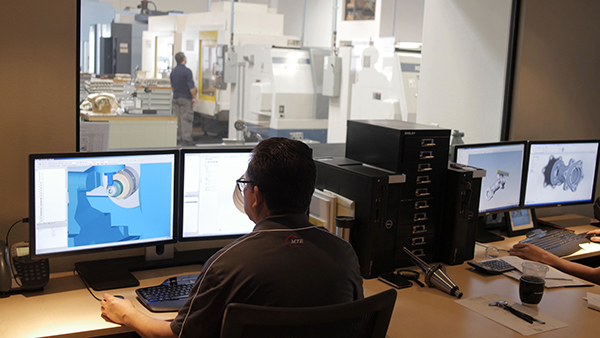At its 30,000 sq ft facility, Metri-Tech manufactures ultra-precision, high-volume components for the aerospace, medical, defence and commercial industries. Based in Huntington Beach, Metri-Tech Engineering is not a typical job shop – that much is evident from the company’s factory filled with automated production equipment, including a wall-mounted live scheduler, which resembles a 2 m tall iPad. Hans Gratzer Jr, COO/CTO of Metri-Tech and son of company founders Hans and Katharina Gratzer, developed the scheduling program to help his 38 employees better visualise what is happening in the shop at any given time and plan for the next jobs. This strategy is part of the company’s forward-thinking approach to automation.

“Most job scheduling systems are number-driven, but people like pictures,” Gratzer says. “With this system, what you see is what you get — kind of like Esprit.”
Metri-Tech has used Esprit CAM software almost since its inception; Gratzer estimates it was first installed in 1988.
“My dad bought the software, and he was very happy with it because we were mainly in the fitting business at that time; he liked that it could program families of parts,” he says. “It was a huge time saving.”
But just as crucial to Metri-Tech were Esprit’s accurate, full-colour simulations, which were said to be the first in the industry.
“That allowed us to give more visibility to our programming and reduce mistakes in our set-up the first time around,” says Gratzer. “Most of our machinists do both the set-up and the machine operation; they know what they’re doing. Now they do not have to worry during the set-up process and first-off run; they know the program will be right due to the precise nature of Esprit simulation, set-up sheets and posts.”
Some 30 years later, Esprit keeps Metri-Tech at the top of its game, thanks to its ease of use and quick support. The company uses the software for full five-axis contour composite milling, swarf milling and multi-axis multi-spindle turning.
“Esprit is very progressive in the five-axis and multi-axis realms,” Gratzer notes. “The software is just easier, faster, stronger and more accurate than other CAM programs we have tested or demonstrated over the years.”

At its plant, Metri-Tech machines all types of materials, including more exotic types like Inconel, titanium, Nitronic, Invar, Kovar, Ferrium, polyurethane, Teflon, PEEK and Ultem, to list but a few.
“Customers use us as a solution; they have problems and we fix them,” Gratzer says. “We’re experts in most manufacturing processes, and our customers come to us for
the precision and quality of part we produce.”
The company started out making fittings, which provided it with an understanding of how these parts fit into the larger assemblies. This comprehension allowed Metri-Tech to gradually move into more complicated parts.
“Doing fittings evolved into us going in the opposite direction: manufacturing the parts the fittings fit into, which were housings and manifolds,” says Gratzer. “Then obviously, when you get into the more complex and assembly side of medical and aerospace, you get into the critical finishes and close tolerances of the internal workings of the manifolds and housings, like spool and sleeve assemblies, and shaft work. It was a very interesting and methodical transition.”
The company operates 42 machines in total, with a number of three-axis Mori Seiki lathes and Nakamura-Tome lathes featuring up to 13 axes, which allow the company to be more creative with small parts. Metri-Tech also runs three and four-axis vertical mills, and several Matsuura five-axis vertical trunnion machines with up to 42 pallets and 520 tools.
In combination, Metri-Tech’s arsenal of machines provides programmers with hundreds of pallets and thousands of different tool options. Many of the shop’s palletised machines are automated, and the company is working to bring in mobile robots to transfer parts from machine to machine, along with virtual augmentation to help programmers easily view the custom manufacturing software and scheduler on the shop floor.
Metri-Tech, which boasts ISO AS9100D certification, offers polishing and ultra-critical finishes, as well as a high-end quality control facility in-house.
“What sets Metri-Tech apart from the competition is the quality when producing components in larger volumes,” says Gratzer. “Anybody can make a few good parts, but consistency and repeatability over larger volumes is the key to our success. Most customers say that quality is a given nowadays; it’s truly not. We take so many steps in assuring a quality part gets to the customer. We have a group of very dedicated employees, and everybody’s looking out for the quality of the product. The main reason why customers come to us is 100% quality, all the time. If they need a job done fast and they need it done right the first time, they come to us.”

Metri-Tech’s performance has been strong since its inception in 1978, but shortly after Gratzer came to work for the company in 1998, and with his vision for technology, automation and reinvestment, the company has experienced significant growth. Forecasts show that Metri-Tech may double its business within the near future.
“I credit the success to our passion for this industry; striving for automation and all the technology we use, including Esprit,” concludes Gratzer. “I feel our next 40 years are going to be stronger than the last 40.”
For further information www.espritcam.com















